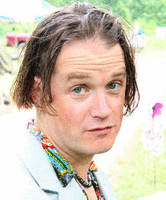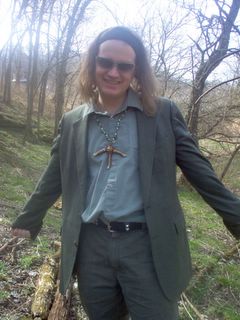
A personal fan site dedicated to the spiritual, political, philosophical, and radical interpretation of U2's music, lyrics, activism, and more. With head and heart connected to the white flag of peace, let's discuss how to get to the higher ground of "One Tree Hill" just outside the "City of Blinding Lights," "Where the Streets Have No Name" and freedom has the scent like the top of my newborn baby's head.
Friday, April 08, 2005
"Where the Streets Have No Name": Bono, Blake, and biblical utopianism
"An interesting story that someone told me once is that in Belfast, by what street someone lives on, you can tell not only their religion but tell how much money they’re making -- literally by which side of the road they live on, because the further up the hill, the more expensive the houses become. You can almost tell what the people are earning by the name of the street they live on and what side of that street they live on. That said something to me, and so I started writing about a place where the streets have no name...." -Bono
“Where the Streets Have No Name” is a rock hymn that suggests an imagined city. Originally conceived in contrast to what Bono knew of the brutal economic boundaries of an embattled Belfast and like the placeless place in John Lennon’s “Imagine,” Bono’s new world is beyond the borders of politics and imagination.
Bono’s words summon visions of desert and barrio, shantytown and wilderness sunrise. This imagined universe is both city of blinding lights and abandoned vista, a new Jerusalem and a rural jubilee, a radical Rivendell and a river rolling down a mountain, a liberated
Based on what I call Blake’s “biblical utopianism,” a notion that echoes “thy kingdom come on earth as it is heaven, ” I believe “Streets” is a call, ultimately, for a classless and borderless transcendence of race, class, and gender divisions. As in other songs, Bono reiterates his recurring theme for economic revolution, egalitarian revival, and ecumenical revelation.
Like William Blake before him, Bono believes in a lyrical cosmos where all things are always already simultaneously spiritual and political. So, the nameless streets signify inner and outer liberation. Thus, what Christopher Hobson asserts about Blake’s visionary poetry applies here: “If there is continual forgiveness of sin, the ideological justification for a hierarchy of social guardians vanishes, a crucial step in convincing people to abolish the hierarchies in reality.”
Clearly, on the current Vertigo tour, Bono brings this aspect of the “Streets” idea to center stage as a rhetorical device advocating the eradication of poverty and the invocation of equality. During what’s come to be known as the “Africa Section” of the show, Bono preaches in an inspired oration that echoes Dr. King, “From the swamplands of
This sense of universal humanity in the likeness of the creator comes cloaked in rock and roll idioms and traverses to a mountaintop beyond ideology. And in its universalist wisdom, this place is every place the listener pictures it to be, whether a biblical Eden/Heaven/New Jerusalem or a secular someplace of economic equality.
While I want to run, I’m no longer willing to hide. Breaking down all borders and walls inside, this hunger for justice is something to shout about. I want the dust cloud of domination to disappear without a trace.
I want to touch this flame in our lifetime, even with those listeners who have commented that this song is singularly about heaven, about the Christian idea of an afterlife. Because like Blake, Bono’s is an “ethical, common-people’s Christianity of tolerance and forgiveness,” we need not wait for the great beyond to become agents of solidarity and justice, hospitality and humility, mercy and meaning.
What would that world look like if we lived where the streets have no name? For the present of Bono’s post-political humanitarianism, it looks like King’s notion of a beloved community beyond the excesses of neoconservative capitalism and the human rights’ errors of old school state communism. For me, it’s clearly a cooperative and antiauthoritarian world based not just on my reading of Blake, Bono, and the bible—but on all this and so much more. Beaten and blown by the winds of cynicism, we can still burn down the old world of narrow-minded oligarchies and build the new one based on love.
Wednesday, April 06, 2005
We're all in a place called vertigo
I'm creating this blog for dedicated listeners and learners with a penchant for delving deeply into discussions, diatribes, and devotions about the spiritual and political side of the band's work. Let's see if I can keep this blog active, at least for the duration of the tour year.
Love, Anu
My first official article on Interference can be found here.

This is my Palm Sunday/Spring Equinox smile. Since spring always makes me feel like listening to U2 as I hike to One Tree Hill, I decided this photo would be best to welcome folks to my new U2topian blog.
